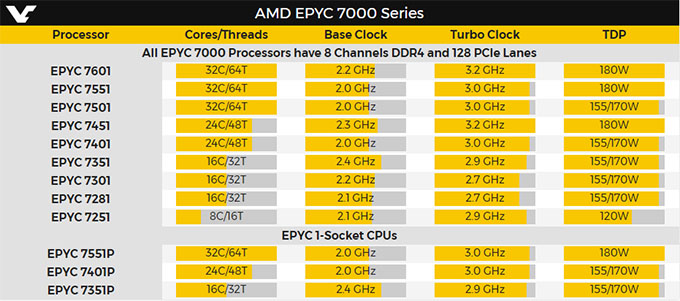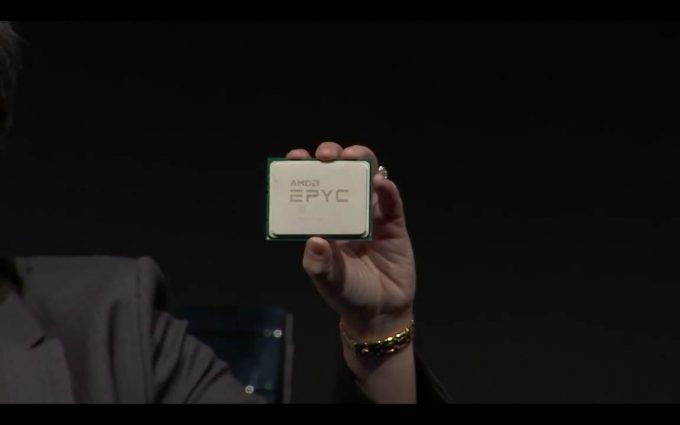- Qualcomm Launches Snapdragon 4 Gen 2 Mobile Platform
- AMD Launches Ryzen PRO 7000 Series Mobile & Desktop Platform
- Intel Launches Sleek Single-Slot Arc Pro A60 Workstation Graphics Card
- NVIDIA Announces Latest Ada Lovelace Additions: GeForce RTX 4060 Ti & RTX 4060
- Maxon Redshift With AMD Radeon GPU Rendering Support Now Available
After Four Years In The Making, AMD’s EPYC Server Processors Are Just Days Away From Launch
Note: We have preliminary coverage of the AMD press event, with some specific details about the EPYC CPUs and the platform in general.
When AMD launched Ryzen earlier this year, the company pulled off what at times seemed impossible: it delivered on its promises. We knew from the get-go that Ryzen’s IPC performance wasn’t going to match Intel’s (because AMD admitted it), but in some cases, that doesn’t matter. The number of cores and threads AMD packs into its Ryzen chips at a given price-point is impressive. So impressive, in fact, that it’s forced Intel’s hand to expedite the launch of some of its own upcoming processors.
It’s been said a hundred (or million) times, but AMD has shaken up the CPU market, infusing it with long overdue freshness. Intel’s already reacted, so now we as consumers get to sit back and watch the next few years play out. And, those few years look to be interesting, especially since AMD is planning to initiate phase two of its Zen rollout next week, with the launch of EPYC.
It’s hard to understate the fact that EPYC is important to AMD. The name even seems self-aware. At present, AMD commands but a mere fragment of the server processor market, but based on what we’ve learned from Ryzen, and what we’ve been told about EPYC, we’re about to see a fight far more intriguing than a boxer and martial artist could ever hope to deliver.
We’ve covered what goods EPYC’s bringing us a couple of months ago, but the important bits are that we’ll see processors with up to 32 cores (64 threads), 64 PCIe lanes (ditto for Threadripper, actually), eight-channel memory, and seriously competitive power consumption for the given performance (a little more than important for the enterprise market).
4 more days to @AMD EPYC launch on June 20. EPYC looking GREAT! Thanks to the @AMDServer team for 4 years of hard work to get us here! pic.twitter.com/AkjsJhW9AV
— Lisa Su (@LisaSu) June 16, 2017
A couple of days ago, website Videocardz leaked what appears to be the initial lineup for EPYC, all part of a 7000 series (which would mirror how the Ryzen launch kicked-off, beginning with Ryzen 7). Models between 8 and 32 cores are set to be offered, with clock speeds sitting between 2.0GHz and 2.4GHz base, and bursting to 3.2GHz for the fastest models.

According to the same source, the smallest EPYC 7000 series chips should begin at under $700, while the top model could slide in under $4,000.
Excited? You should be. At this point, it’s not clear if there’s going to be a stream for the launch event on June 20, but I’ll update this post if one comes along (as well as share it on our social media channels). Update: Check the link at the begining of the article for more details about the AMD event, with details on the EPYC CPUs and platform.





